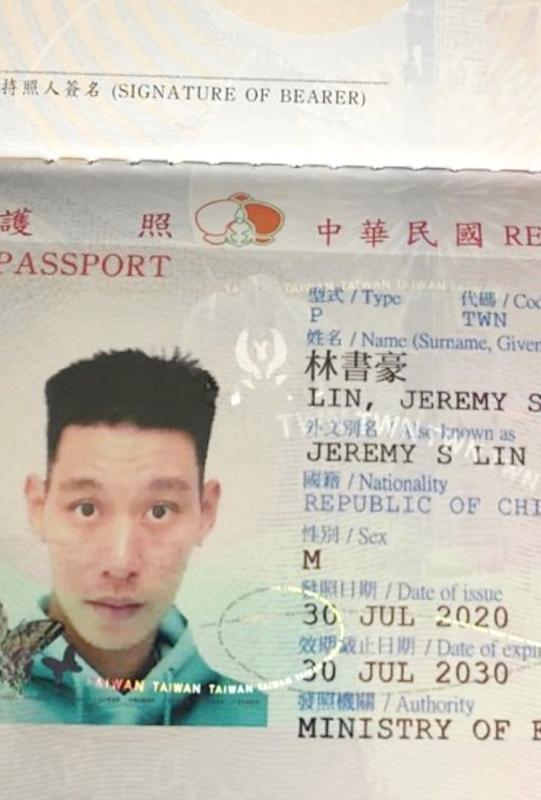Former NBA player Jeremy Lin (林書豪), a Taiwanese-American, has become a Republic of China (ROC) citizen and received an ROC passport, raising hopes among basketball fans that the 32-year-old might make the national basketball team.
Taipei City Councilor Chung Hsiao-ping (鍾小平), an independent, yesterday confirmed that he had accompanied Lin’s father and Lin’s agent when the father went to apply for Lin’s ROC passport.
“He [Lin] is very willing to represent Taiwan in international games,” Chung said.

Photo courtesy of Taipei City Councilor Chung Hsiao-ping
Chung said that he, Lin’s father and Lin’s agent visited the Ministry of the Interior (MOI) in Taipei to express their gratitude to Minister of the Interior Hsu Kuo-yung (徐國勇) after receiving the passport.
The California-born Lin, a Harvard University graduate who became the first Taiwanese-American to play in the NBA when he was signed by the Golden State Warriors in 2010, made headline news in 2011 and 2012 when as a point guard he helped led the New York Knicks to a series of wins, starting a phenomenon that became known as “Linsanity.”
He is eligible for ROC citizenship because both of his parents were born and raised in Taiwan.
Lin, who has had a journeyman’s career in the NBA, received an NBA championship ring last year as a member of the Toronto Raptors.
In August last, Lin signed with the Beijing Ducks of the Chinese Basketball Association and was instrumental in leading the team to the semi-finals in the 2019-2020 CBA league playoffs that began last month.
Lin had an average of 22.4 points per round, 5.6 rebounds and 5.6 assists during his time with the Ducks.
Lin told Chinese reporters that he would “take a break” before deciding whether he to renew his contract with the Ducks.
The Chinese-language United Daily News yesterday reported that the interior ministry responded to the news of Lin getting an ROC passport by saying that it was the Ministry of Foreign Affairs that issues passports.
If Lin, who does not have a household residency in Taiwan, had applied for an ROC passport, he would have had to follow procedures, although there is a special provision that would allow him to keep his ROC citizenship even if he entered and left the nation multiple times in a year, the interior ministry said.
If Lin wanted to apply for residency, it would observe the same regulations that it follows to help citizens without household registries in this nation, although he would likely be approved according to rules covering the granting of residency to “high-level professionals,” the interior ministry said.
Additional reporting by CNA

Taiwan has received more than US$70 million in royalties as of the end of last year from developing the F-16V jet as countries worldwide purchase or upgrade to this popular model, government and military officials said on Saturday. Taiwan funded the development of the F-16V jet and ended up the sole investor as other countries withdrew from the program. Now the F-16V is increasingly popular and countries must pay Taiwan a percentage in royalties when they purchase new F-16V aircraft or upgrade older F-16 models. The next five years are expected to be the peak for these royalties, with Taiwan potentially earning

STAY IN YOUR LANE: As the US and Israel attack Iran, the ministry has warned China not to overstep by including Taiwanese citizens in its evacuation orders The Ministry of Foreign Affairs (MOFA) yesterday rebuked a statement by China’s embassy in Israel that it would evacuate Taiwanese holders of Chinese travel documents from Israel amid the latter’s escalating conflict with Iran. Tensions have risen across the Middle East in the wake of US and Israeli airstrikes on Iran beginning Saturday. China subsequently issued an evacuation notice for its citizens. In a news release, the Chinese embassy in Israel said holders of “Taiwan compatriot permits (台胞證)” issued to Taiwanese nationals by Chinese authorities for travel to China — could register for evacuation to Egypt. In Taipei, the ministry yesterday said Taiwan

POSITIVE DEVELOPMENT: Japan and the US are expected to hold in-depth discussions on Taiwan-related issues during the meeting next month, Japanese sources said The holding of a Japan-US leaders’ meeting ahead of US President Donald Trump’s visit to China is positive news for Taiwan, former Japan-Taiwan Exchange Association representative Hiroyasu Izumi said yesterday. After the Liberal Democratic Party’s landslide victory in Japan’s House of Representatives election, Japanese Prime Minister Sanae Takaichi is scheduled to visit the US next month, where she is to meet with Trump ahead of the US president’s planned visit to China from March 31 to April 2 for a meeting with Chinese President Xi Jinping (習近平). Japan and the US are expected to hold in-depth discussions on Taiwan-related issues during the

‘LIKE-MINDED PARTNER’: Tako van Popta said it would be inappropriate to delay signing the deal with Taiwan because of China, adding he would promote the issue Canadian senators have stressed Taiwan’s importance for international trade and expressed enthusiasm for ensuring the Taiwan-Canada trade cooperation framework agreement is implemented this year. Representative to Canada Harry Tseng (曾厚仁) in an interview with the Central News Agency (CNA) said he was increasingly uneasy about Ottawa’s delays in signing the agreement, especially as Ottawa has warmed toward Beijing. There are “no negotiations left. Not only [is it] initialed, we have three versions of the text ready: English, French and Mandarin,” Tseng said. “That tells you how close we are to the final signature.” Tseng said that he hoped Canadian Prime Minister Mark Carney